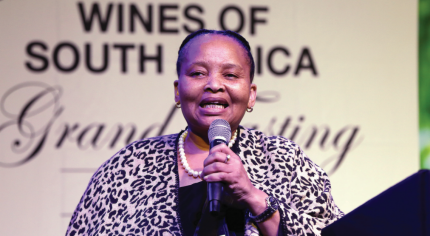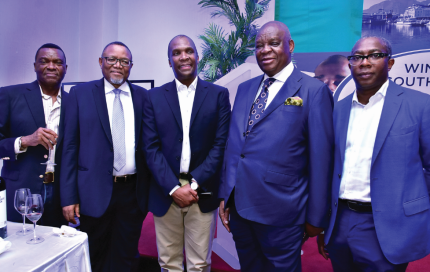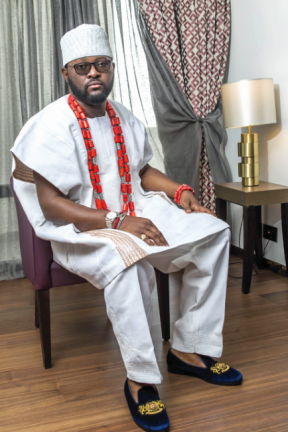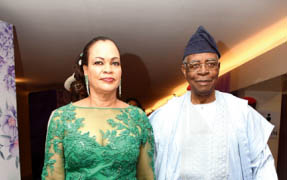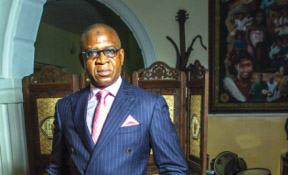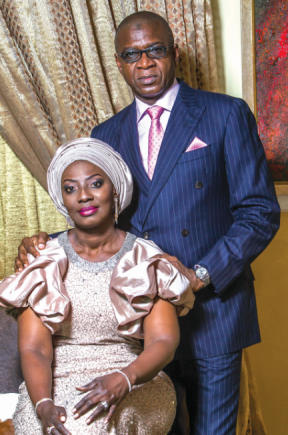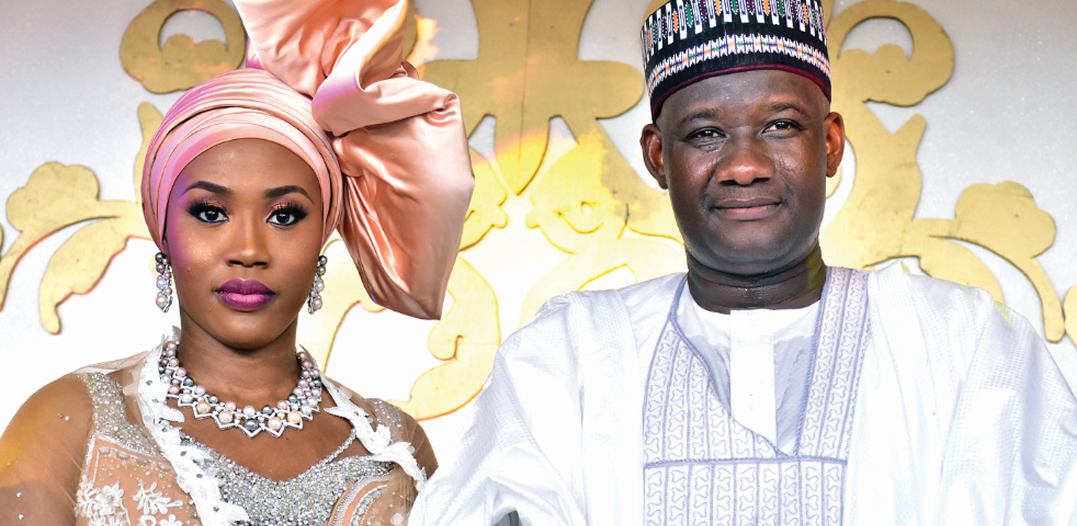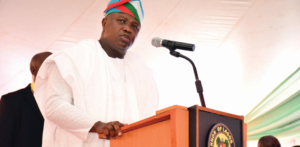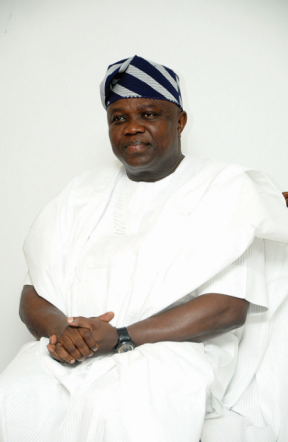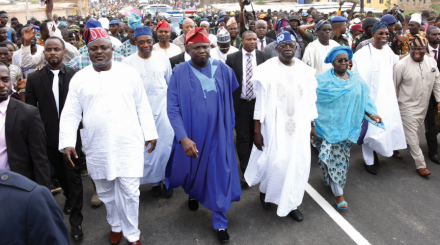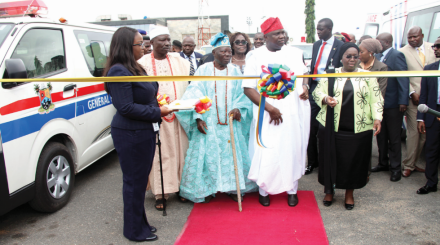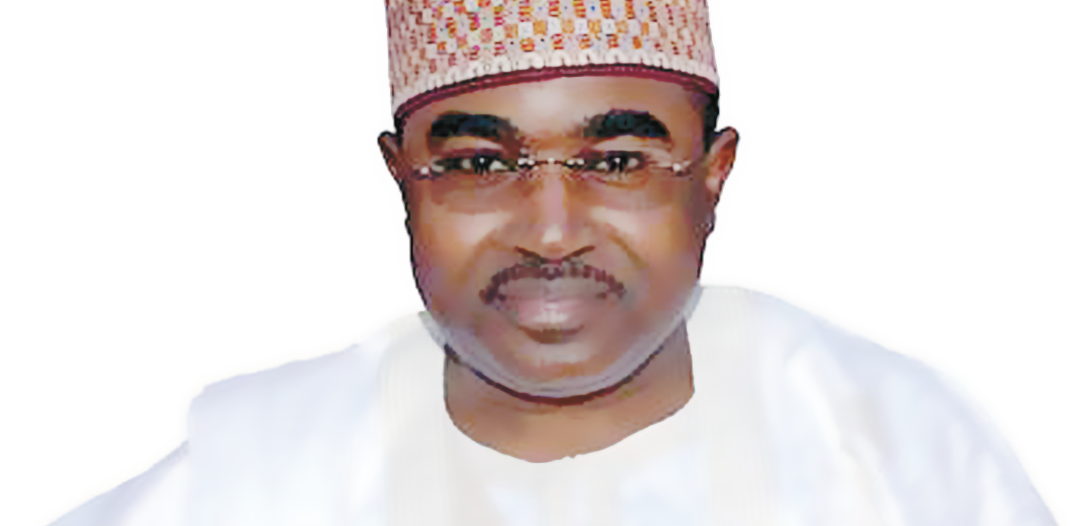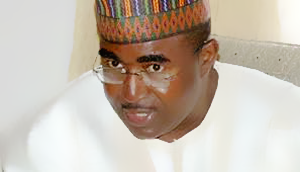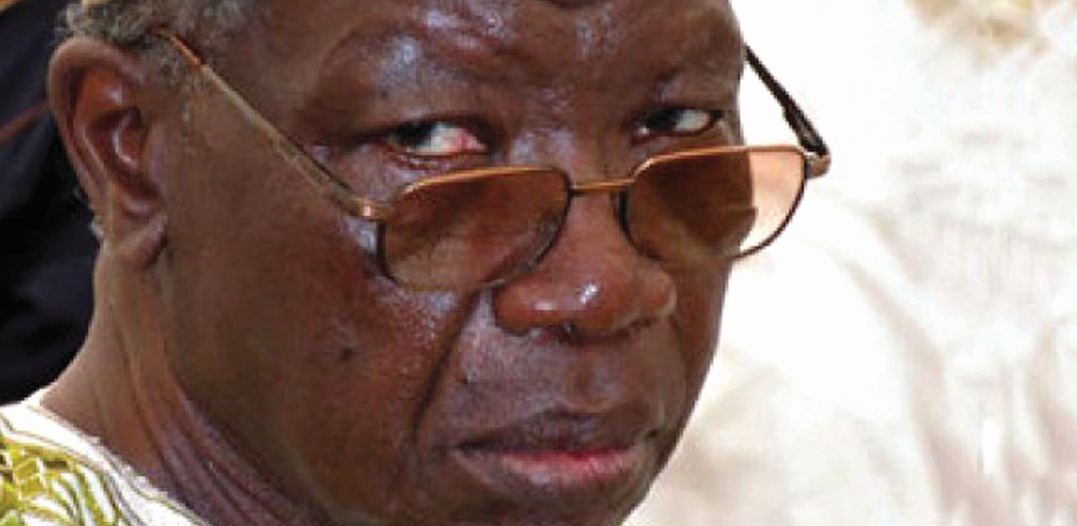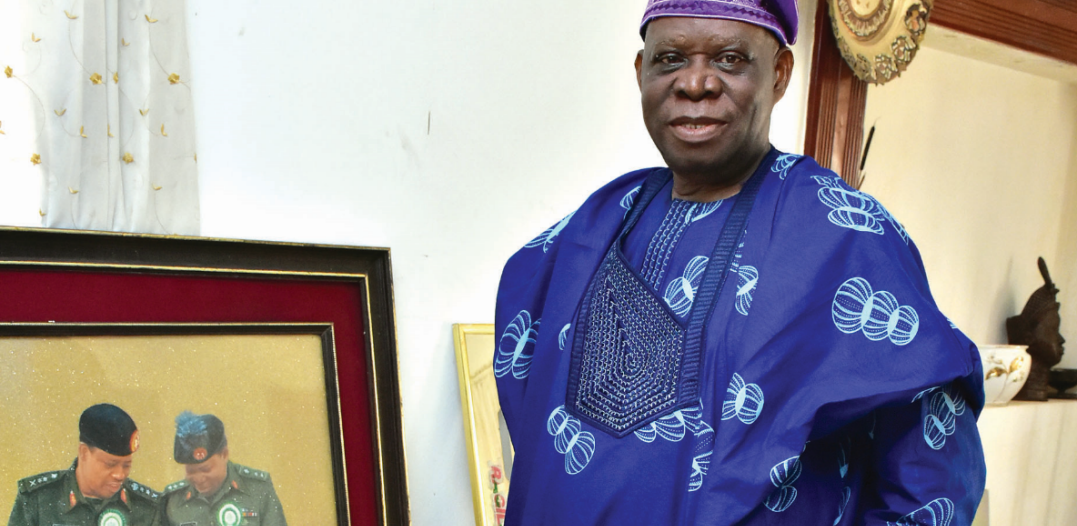 Brigadier-General Raji Rasaki (Rtd) has this no nonsense look that most people associate with soldiers. As Military Governor of Lagos, the fear of the then Colonel Raji Rasaki was the beginning of wisdom. He tackled robbers, He built roads and levelled the dreaded shanty town called Maroko, which has given birth to today’s Oniru/Victoria Island Extension. He is an epitome of discipline and has zero tolerance for lateness. When we fixed this interview for 10am in Ibadan, Oyo State, his aides warned us not to be late.
Brigadier-General Raji Rasaki (Rtd) has this no nonsense look that most people associate with soldiers. As Military Governor of Lagos, the fear of the then Colonel Raji Rasaki was the beginning of wisdom. He tackled robbers, He built roads and levelled the dreaded shanty town called Maroko, which has given birth to today’s Oniru/Victoria Island Extension. He is an epitome of discipline and has zero tolerance for lateness. When we fixed this interview for 10am in Ibadan, Oyo State, his aides warned us not to be late.
Therefore, when we got to his gate by 9.30 am, he beamed with a smile-and the first thing he said was “ I am impressed, if you had come one minute late, you would have been dismissed and asked to return another day”. We then spent over one hour discussing his years as the number one citizen of Lagos
Sir what was your reaction when you heard you had been appointed as the military Administrator of Lagos state
Let me correct that impression. I was not a Military Administrator, that was Abacha’s own coinage, I was a Military Governor of Lagos. Before coming to Lagos, I was in Ogun State. In fact I was a member of the Armed Forces Council and by 1986 I was moved to Ogun state and by 1988 August I was moved to Lagos State. I cannot say much about the criteria used by the then military President, General Ibrahim Babangida, but without mincing words, when we look at the army officers that were around at that time, I can say that I was one of those that could be reckoned with.
Was it because General Rasaki was seen as a tough man that can handle the complexities of Lagos
No it was not that, a military man’s action to a civilian seems like he is tough, but we are trained to be disciplined, to tackle unfavourable environments which to the ordinary eyes will give the impression of toughness.
What did you meet on ground when you came to Lagos
I took over from the late Admiral (Mike) Aikhigbe. Like I said earlier, I was in Ogun, a state that is filled with enlightened people, people who are very sound and politically aware. And anyone who rules such a state must be ready to think ahead of the people and be creative. I will say I had a good preparation for the Lagos assignment from my experience in Ogun and maybe that was why General Babangida moved me there.
Lagos was the Federal Capital and the commercial nerve centre of the country, in terms of the people living in Lagos, it was a complex mix of people from across Nigeria, you had the elites, the poor and all the diplomats too living in Lagos. Lagos is an international nerve centre of Nigeria because whatever happens in Lagos affects the whole country.
I must confess Lagos has been very lucky in the sense that continuity has always been there, when a governor comes, whether a project is good or not, his successor always tries to finish or improve on it.
That has always been my own concept as a Commander, if I take over a Command, I will first ensure I finish what was started by my predecessor because at the end of the day, any project that you build now may not seem useful now but can become so in future. Abandonment of a project is gross waste of tax payers money.
I give you an example, in Ogun, we built Political Party offices for Social Democratic Party (SDP) and National Republican Congress (NRC), and after Babangida left, the parties were scrapped but those buildings became health centres and some were turned to Local Government offices.
I must confess that is one thing that other states in the federation are suffering from and I must commend past and present Governors of Lagos for that spirit of continuity.
What these governors do not understand is that they have only four years, maximum eight, so if you ignore projects started by your predecessor and start all by yourself, how many can you actually complete? That is why if you go round the whole country, you will find lots and lots of abandoned projects that have gone through three or four governors.
There are two people that I would always salute for their work in laying the foundation for what Lagos has become today: General Mobolaji Johnson and Alhaji Lateef Jakande.
I started modernizing schools, though (Gbolahan) Mudashiru also did some work there, because Baba kekere (Jakande) did a lot of work in that respect.
People were rubbishing him, he put up sheds, he put up poultry as school buildings, but he got the job done. And go round Lagos today, you will find schools everywhere, if you want to start a school of that nature now and at that scale, you know how much that will cost? So what we did when I came in was to begin to modernize the schools.
Imagine reducing all the shifts to one period. That was a tremendous achievement by Jakande, it made our work easier and he had also acquired a lot of land for it too, so all we did was continue from that foundation.
So what were the major projects that you executed
We did a lot because my focus was rural development because I happen to come from a rural area. So my dream was to turn around places like Mushin, Ajegunle etc. And then upgrade Isale Eko. Then I wanted to improve the environment. We also invested in Agriculture and built the Farm Institute in Epe area.
The beauty of the Institute was that when the students finish, we will give them maybe two hectres each to begin their work. It worked very well, we did the rural roads, the Coastal Road from Akodo to the boundary of Ogun State. It is a pity other governors did not continue that road that would have taken you all the way to Bar Beach.
We upgraded the Adiyan Water Works. I found something strange when I visited Iju Water Works. We had the Water Works but when you get to as close as Agege there was no water. Jakande did the mini water works, we boosted it. The Colonial Masters were so funny, from Iju, water was taken straight to GRA Ikeja and environs and none was supplied to the people of Agege.
Another aspect was the Model Schools, it was the creation of Akhigbe, he began the five Models schools and we came and completed them, one in each of the five divisions.
There is one thing we did that anytime I remember, I am always very happy. The day I was to arrive Lagos, maybe the armed robbers did not know the fellow they were sending to Lagos, they welcomed me with a serious armed robbery operation around the toll gate.
So I called the Commissioner of Police, I also called I think either Shagaya or Bamaiyi, one of them was Commanding the Military in Lagos, I met them and we created a special force, I now bought unmarked vehicles for this force.
Remember, there were reports that we were training a killer squad underground and all that, yes, it was true, they were specially-trained to combat armed robbery. The robbers had become a menace, and we had to change tactics to combat them.
The Special forces were posted to dark spots, they were in mufti, and they will pretend as if their vehicles had broken down and surely the robbers will come and they will engage them.
One day, just to see things for myself, I led one operation myself, it was around Ahmadiyya Grammar School in Agege, this one happened in broad daylight.We got about three of them that day.
My instruction was for them to arrest these criminals, but when they engage the team in gun battle, I told them don’t bother to make any arrest, kill and leave the place. I told them, I did not have money to feed dangerous criminals.
People were complaining that there were so many dead bodies on the streets, I just kept quiet, those bodies were those of the robbers. In no time, Lagos was too hot for them and they moved to other parts of the country.
Imagine what is happening with the issue of kidnapping today, the Government has to do more about it, they have to establish a crack team. By now we should have a full report of the Modus Operandi of these kidnappers, once that is discovered, they can be easily countered.
The force should have special training. The whole of Lagos and Ogun Coastal area is now so dangerous that no one is safe. Urgent action is needed in that direction, we have to all sit down and map out strategies to deal with this.
I am told they come in pretending to be fishermen, I said, we can start by imposing a curfew in that area. What will a fisherman be doing in the creek around 12 midnight? What type of fish do you want to catch at that time? We can say anybody seen after 6pm, we will deal with you, in any action there will be equal reaction.
If they come during the day, it is easier for them to be tracked, so they strike at night or dawn. Our team will be there 24 hours and moving from one hideout to the other because that is how this criminal boys are moving.
We have to map out a good security architecture to end this nonsense. Ambode is trying with the kind of investment he has made in the area of security but he has to do more in this regard.
I must add that when I took action against the robbers, I insured the lives of the Police and Military men that were part of this special force. We used to do continuous training and change them every six months so people don’t get comfortable at the post and start misbehaving or become compromised.
I don’t think it is okay to send soldiers to go and mount road blocks for three months, six months, at the end of the day, they will lose credibility.
Lastly, the third mainland bridge.
Yes, a lot of people do not know that you were instrumental to the construction of the famous Third Mainland Bridge, tell us the full story
By the way, I am very much in support of what Governor Ambode did, by speaking up about his frustration concerning the Airport/Oshodi Expressway. Sometimes, you need to blackmail the Federal Government to get some of these things done. I did the same thing with the Third Mainland Bridge.
I remember General Babangida had come back from a trip and I had gone to receive him, despite the fact that we were using siren, it was tough passing through traffic because we passed through Yaba to Dodan Barracks.
So when we got there, I saluted and turned back. I could see that he was looking very unhappy. Akhigbe had tried with the issue but the next day, I went to Babangida and said, sir this traffic situation is bad, can you please let us sit down and discuss how to finish this bridge.
General (Mamman) Kotangora, who was the Minister of Works, said the end, that is the Oworonshoki side is a built up area and it will be impossible to navigate it. I said sir, can you please give me the map, they said it is with Julius Berger.
When I left there, I went to Julius Berger, I got the map, and in the process of checking that map, I saw the Coastal Road up till Calabar, that was how I began the Coastal Road. That map is there, we can still look at it. So I went to him and said, Sir I know this is a Federal Project but it is my people that are suffering, can we do this 50-50. If we can’t pay, you can take it from source.
That was how we then introduced the Development Levy, it was for the Third Mainland Project mainly. That was when Gani Fawehinmi took me to court. I was not bothered because I knew we were doing something that will benefit majority of Lagosians.
We then started work, we had got half of the way, I think that was around 1989, I believe I had just lost my wife. Babangida now said, there was no money. I said that is not possible. I told him, I have been to Abuja, I saw what is happening there, so I told him: the method you are using in Abuja, let us use it in Lagos, even if we are going to use oil to exchange for the funds because Lagos was too critical to the nation’s economy.
Bode Emmanuel used to be the Chairman of one of the construction companies, that is how we became close. I told him you are a Lagosian, please let you company continue the job, we are working on payments, I also called Julius Berger and gave them assurances. There was one Dafinone that also came to our rescue, we then also told Government to collect some of the money from source too.
That was why I was on that site every day to ensure that work was going on as scheduled.But we had a problem at Oworonshoki, one Baale and one Imam, came, they were complaining about the houses that were in the right of way, I told them, please this road is greater than all of us, nothing must stand in its way.
They were still complaining. I just kept quiet, I went to the Army Engineers, I think Ihejerika was in charge of the Army Engineers, I told them I want that place cleared for the road in 24 hours. I told them that they should clear everything on the path of the bridge on the weekend, so that they cannot go to court and stop us. Fadayomi was my Commissioner of Justice and Baba (Teslim) Elias was with us, I also went to Rotimi Williams, they said start the operation by Friday and before they can go to court on Monday, you have completed your operation. I loved that idea.
I was happy with the kind of advice I got . Just as we were talking, one man came in from Julius Berger, a very nice man that I worked closely with during the project.
He said, I should not use Army Engineers that there was another way we can do it, that if we use the Army, we will be blackmailed.I said I don’t care. We cleared the bridge area, there were no houses for many metres, but today, the plan was to allow space in case there is future expansion.
But today I have seen houses on both sides, when I noticed that Ambode was doing some work there, I thought he will bring down those houses, that is the difference between the civilian and military government. We do not care about re-election, we just get the job done. When we cleared the place, off course, the people went to court, but the deed had been done and that was how Justice Esho used the word Executive Rascality, and you the media starting singing about it, but we did not let that disturb us. Today, we are all enjoying the Third Mainland Bridge.
Another thing we did that made me happy was those beggers we cleared in Ebute Metta and sent them to Kano. I read the Quran very well, there is nowhere where you should be a beggar permanently. Sanusi said the right thing. How come there are no beggers littering the streets of Saudi? I saw them as a nuisance dirtying the state, I was happy that Babangida did not react when I took that action.
Now, lets talk about Maroko, the every contentious issue, what made you take that decision
Honestly I have no regrets for what we did at Maroko.That area I know very well, Victoria Island stopped at Adetokunbo Ademola area, the other places was marshy land. We used to carry out training exercises there. General Garba used to take us there anytime we had promotion exams because that time in the Army, you cannot move up except you pass your exams. I don’t know what operates there now.
The place where I stay now in Lagos is part of the extension. Anyway, I had planned to begin some redevelopment in the area, but one of these days we went to Epe, and Babangida was in the vehicle. We were returning at about 8pm and we were attacked by robbers.
Before them, I had been getting terrible reports from the area and on two occasions, I have had to ensure that the Inspector-General removed the DPO of the area.
Anyway, we were returning from Epe, we passed the first wave of attack, and then there was this terrible one around the present Lekki Phase one. We heard gun shots. I asked my Oga (Babangida) to continue, I jumped out of the vehicle and confronted them. We pursued this people and they all ran into Maroko.
The next morning, I called the Baale, I ordered him to fish out those people, he began to give excuses. I kept quiet but later went to apologize to Babangida for the incident.
Before taking the Lagos appointment, I had asked Babangida that he must hold me responsible for any action I take. I am a very principled person, even my children know this, and when they complain, I tell them once a soldier, always a soldier. Anyway, I went to Babangida, I told him sir this Maroko incident, I said I wanted to level the place. He said Rasaki, you cannot do it. I said have you forgotten about our agreement, he said, no don’t do it.
At that period, I called Mr Adeyemi, he was Permanent Secretary of Environment in Lagos State, he said he cannot do it and that baba Jakande tried but he failed. I said me, I am a soldier, I am trained to make the impossible possible.
I said I have heard you sir. Babangida was travelling outside around that period, I called my group, I have a team of officers that I trained at NDA.I went to signal, I went to Armoury, I told them by Monday morning, I don’t want to see Maroko standing.
Babangida was going for two weeks so I gave the people, one week notice, we went again on Friday and by Monday, we levelled the place. What we saw was shocking, we saw shallow graves, we saw fake hospitals, I wanted to prosecute the Baale but for the plea of Oba Oyekan.
We moved some of the residents who had genuine papers to Abesan Estate. Whatever you say about it, you have to give it to Babangida, when the people like Oniru family, Dideolu Estate came with their claims, he said we should give the land them. Look, we demolished houses owned by military offices too
So that was how we did Maroko. I have no regrets at all.If we did not clear Maroko, the people in Victoria Island and Ikoyi would have had no rest.I did it with good conscience.
I think Fashola should have done same when he wanted to flush out Makoko. That shanty is not benefitting anybody.
So how do you feel when you pass through the area today
I feel very happy that the shanty town has become modernized and decent.
Have you heard that you had a nickname, who build this gadder
(laughs heartily) Of course, I heard it and when I checked the dictionary. I discovered that there was nothing wrong in what I said since gadder and bridge mean the same thing, I am a telecommunications engineer, so I just laughed over it.
Any regret?
Yes, I was not happy that we were not able to do the Ijanikin Road to meet the Ring Road. I had just six months.We wanted to do a road passing through the (Federal School of Arts & Science) FSAS pass the Officers Mess all the way to Niger Dock Area. Babangida said I should award the contract. I used to drive around myself and I see things.
The road was to cost N2.2billion at the time. That would have solved the problem we have today at Mile 2. That is what I see that Ambode is doing and I commend him. We were to also do the 4th Mainland Bridge.
Are you happy when you come to Lagos these days
I am happy because each time I come in, there is always something new.
So Lagos is 50, what would you like to say to Lagosians
I congratulate Lagos. My Lagos of the future is a Lagos that looks like Sweden or Denmark. By improving the human resources in Lagos, developing ICT Industry and improving the Acquatic Economy.I have travelled very wide, and seen things, I believe with the IGR of Lagos, Lagos would be a Mega city
Lastly, there was an issue you brought up at the CONFAB on special status for Lagos
Yes, I am a strong advocate for a special status for Lagos. I want us to have 50 oer cent share of whatever monies we make here in Lagos. Look at NPA, the ship for instance, it is the people of Lagos that bear the brunt of the environmental pollution. The useless smelly oil, the fumes etc. So why can’t Lagos have 50 per cent of the money realised from this activity. We were the first to put up a dec ree on environmental pollution.
I kept speaking to Babangida about it and they eventually said they were working on ecological fund.I did not receive it, but Otedola did. When Tinubu came, I used to tease him that he should have gone to join the army, he did a lot of things, without caring about the political implication.
We also fought for Population to be added as criteria for sharing, Lateefat Okunnu was my Deputy then, she was in the Federal Ministry, and brought her experience to bear.
How come you are not in politics, like other Generals
I tried it but I have seen that it is not for me. People do not like men like me who are principled with intergrity. Also, I am a man of tradition, I cannot stomach the way these young boys are abusive and the general lack of discipline, when we used to go to Baba Adedibu’s house, you will see all these boys jumping on his bed, doing all manner of things, dirtying the whole place, When I was involved, they all wait outside my gate. My wife and some of my children are there.
That is enough, we will contribute from where we are.
 An ardent passion for the beautiful game gleaned from the streets of Freetown playing football with her brothers and their friends has bloomed magnificently into a distinguished career in football administration. The lessons imbibed from her father who was co-founder of football club, East End Lions F.C. in Freetown and who also took her to see football matches, have undoubtedly formed the building blocks of her success.
An ardent passion for the beautiful game gleaned from the streets of Freetown playing football with her brothers and their friends has bloomed magnificently into a distinguished career in football administration. The lessons imbibed from her father who was co-founder of football club, East End Lions F.C. in Freetown and who also took her to see football matches, have undoubtedly formed the building blocks of her success. first Sierra Leonean to head such a committee in the organisation’s 60-year history.
first Sierra Leonean to head such a committee in the organisation’s 60-year history.



